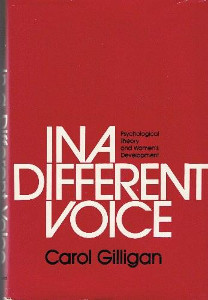Related Research Articles
Lawrence Kohlberg was an American psychologist best known for his theory of stages of moral development.
In developmental psychology and moral, political, and bioethical philosophy, autonomy is the capacity to make an informed, uncoerced decision. Autonomous organizations or institutions are independent or self-governing. Autonomy can also be defined from a human resources perspective, where it denotes a level of discretion granted to an employee in his or her work. In such cases, autonomy is known to generally increase job satisfaction. Self-actualized individuals are thought to operate autonomously of external expectations. In a medical context, respect for a patient's personal autonomy is considered one of many fundamental ethical principles in medicine.

Carol Gilligan is an American feminist, ethicist, and psychologist, best known for her work on ethical community and ethical relationships.
A moral hierarchy is a hierarchy by which actions are ranked by their morality, with respect to a moral code.
The social cognitive theory of morality attempts to explain how moral thinking, in interaction with other psychosocial determinants, govern individual moral conduct. Social cognitive theory adopts an "interactionist" perspective to the development of moral behavior. Personal factors of the individual, such as individual moral thought, emotional reactions to behavior, personal moral conduct, and factors within their environment, all interact with, and affect each other. Social cognitive theory contests, in many ways, with the stage theories of moral reasoning. Social cognitive theory attempts to understand why an individual uses a lower level of moral reasoning when they are, theoretically, at a higher level. It also attempts to explain the way social interactions help to form new, as well as change existing, moral standards. The influence of modeling and other such social factors are explored as functions of growth and development. Albert Bandura also believes that moral development is best understood by considering a combination of social and cognitive factors, especially those involving self-control.
Lawrence Kohlberg's stages of moral development constitute an adaptation of a psychological theory originally conceived by the Swiss psychologist Jean Piaget. Kohlberg began work on this topic as a psychology graduate student at the University of Chicago in 1958 and expanded upon the theory throughout his life.

Bernard Joseph Francis Lonergan was a Canadian Jesuit priest, philosopher, and theologian, regarded by many as one of the most important thinkers of the 20th century.
In moral psychology, social intuitionism is a model that proposes that moral positions are often non-verbal and behavioral. Often such social intuitionism is based on "moral dumbfounding" where people have strong moral reactions but fail to establish any kind of rational principle to explain their reaction.
Loevinger's stages of ego development are proposed by developmental psychologist Jane Loevinger (1918–2008) and conceptualize a theory based on Erik Erikson's psychosocial model and the works of Harry Stack Sullivan (1892–1949) in which "the ego was theorized to mature and evolve through stages across the lifespan as a result of a dynamic interaction between the inner self and the outer environment". Loevinger's theory contributes to the delineation of ego development, which goes beyond the fragmentation of trait psychology and looks at personality as a meaningful whole.

In psychology and psychotherapy, existential crises are inner conflicts characterized by the impression that life lacks meaning or by confusion about one's personal identity. Existential crises are accompanied by anxiety and stress, often to such a degree that they disturb one's normal functioning in everyday life and lead to depression. This negative attitude towards life and meaning reflects various positions characteristic of the philosophical movement known as existentialism. Synonyms and closely related terms include existential dread, existential vacuum, existential neurosis, and alienation. The various aspects associated with existential crises are sometimes divided into emotional, cognitive, and behavioral components. Emotional components refer to the feelings they provoke, such as emotional pain, despair, helplessness, guilt, anxiety, or loneliness. Cognitive components encompass the problem of meaninglessness, the loss of personal values or spiritual faith, and reflections about one's own mortality. Outwardly, existential crises often express themselves in addictions, anti-social and compulsive behavior.
The theory of positive disintegration (TPD) is an idea of personality development developed by Polish psychologist Kazimierz Dąbrowski. Unlike mainstream psychology, the theory views psychological tension and anxiety as necessary for personal growth. These "disintegrative" processes are "positive", whereas people who fail to go through positive disintegration may stop at "primary integration", possessing individuality but nevertheless lacking an autonomous personality and remaining impressionable. Entering into disintegration and subsequent higher processes of development occurs through developmental potential, including over-excitability and hypersensitivity.
James William Fowler III (1940–2015) was an American theologian who was Professor of Theology and Human Development at Emory University. He was director of both the Center for Research on Faith and Moral Development, and the Center for Ethics until he retired in 2005. He was a minister in the United Methodist Church. Fowler is best known for his book Stages of Faith, published in 1981, in which he sought to develop the idea of a developmental process in "human faith".
Student development theory refers to a body of scholarship that seeks to understand and explain the developmental processes of how students learn, grow, and develop in post-secondary education. Student development theory has been defined as a “collection of theories related to college students that explain how they grow and develop holistically, with increased complexity, while enrolled in a postsecondary educational environment”.

In a Different Voice: Psychological Theory and Women's Development is a book on gender studies by American professor Carol Gilligan, published in 1982, which Harvard University Press calls "the little book that started a revolution".
Self-acceptance is acceptance of self.
Positive adult development is a subfield of developmental psychology that studies positive development during adulthood. It is one of four major forms of adult developmental study that can be identified, according to Michael Commons; the other three forms are directionless change, stasis, and decline. Commons divided positive adult developmental processes into at least six areas of study: hierarchical complexity, knowledge, experience, expertise, wisdom, and spirituality.
Values education is the process by which people give moral values to each other. According to Powney et al. It can be an activity that can take place in any human organisation. During which people are assisted by others, who may be older, in a condition experienced to make explicit our ethics in order to assess the effectiveness of these values and associated behaviour for their own and others' long term well-being, and to reflect on and acquire other values and behaviour which they recognise as being more effective for long term well-being of self and others. There is a difference between literacy and education.
In sociology and other social sciences, internalization means an individual's acceptance of a set of norms and values through socialisation.
Moral development focuses on the emergence, change, and understanding of morality from infancy through adulthood. The theory states that morality develops across a lifespan in a variety of ways and is influenced by an individual's experiences and behavior when faced with moral issues through different periods of physical and cognitive development. Morality concerns an individual's reforming sense of what is right and wrong; it is for this reason that young children have different moral judgment and character than that of a grown adult. Morality in itself is often a synonym for "rightness" or "goodness." It also refers to a specific code of conduct that is derived from one's culture, religion, or personal philosophy that guides one's actions, behaviors, and thoughts.
Self-transcendence is a personality trait that involves the expansion or evaporation of personal boundaries. This may potentially include spiritual experiences such as considering oneself an integral part of the universe. Several psychologists, including Viktor Frankl, Abraham Maslow, and Pamela G. Reed have made contributions to the theory of self-transcendence.
References
- Mac Laughlin, Alfredo J. (2008), "Conversion: The Etymological Context", Narratives of Hope: A Philosophical Study of Moral Conversion, Loyola University, p. 476, ISBN 978-0549840107 , retrieved October 6, 2012
- Doran, Robert M. (2011), "Moral Conversion from and to" (PDF file, direct download 61.8 KB), What Does Bernard Lonergan Mean by ‘Conversion’?, University of Toronto Press, p. 20, retrieved October 7, 2012
- Conn, Walter E. & Wolski Conn, Joann (1982), "Beyond Self-satisfaction", Spirituality Today, 34 (4): 303–311, Conversion as Self-Transcendence Exemplified in the Life of St. Thérèse of Lisieux, archived from the original on January 21, 2001, retrieved October 9, 2012